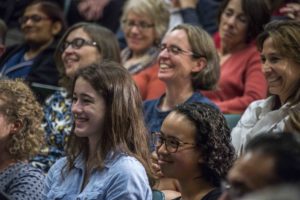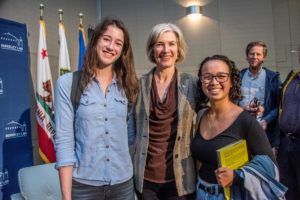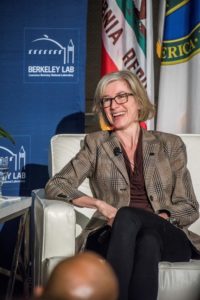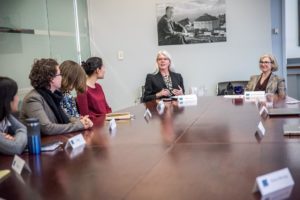The Director’s Distinguished Women in Science Speaker Series at Berkeley Lab kicked off on Monday, November 20, with Jennifer Doudna, a faculty scientist in the Molecular Biophysics & Integrated Bioimaging (MBIB) Division, interviewed by NPR science correspondent Joe Palca. Doudna and Palca began the conversation by highlighting a common connection: They are both graduates of Pomona College in Southern California. From there, they covered a lot of ground, providing a vivid backdrop for the answer to the most pressing question of the day: How did Doudna discover the CRISPR/Cas9 genome editing tool?
Doudna talked about how, as a graduate student, she worked with Jack Szostak, a professor of genetics at Harvard University, to determine the molecules that would serve as the origin of life. While she was there, she designed a self-replicating RNA. Her interest piqued by this project, she wondered what these molecules would look like. She became a research fellow at the University of Colorado at Boulder with Tom Cech, a distinguished professor in the Department of Chemistry and Biochemistry, who studied catalytic RNA. In his lab, she began crystallizing RNA so that she could study their structure and understand the physical basis of catalysis. While on the faculty at Yale University, she continued her study of catalytic RNA, and when she moved to the University of California, Berkeley (UC Berkeley), she pursued her interest in how RNA molecules decide what genetic information gets disseminated in cells.

Doudna was approached by Jill Banfield, a professor in the Departments of Earth and Planetary Science and Environmental Science, Policy, and Management at UC Berkeley, who met her for a coffee at the Free Speech Movement Café to talk about a phenomenon she had noticed in bacterial DNA. Banfield was working on the metagenomics of bacteria and she wanted to discuss an array of sequences she had found, a repeated pattern of DNA between two sequences. She wondered whether these sequences actually were being used in cells and turned to Doudna for her expertise. Doudna and her collaborators applied for money through Berkeley Lab’s Lab-Directed Research and Development (LDRD) program, which allowed them to hire Blake Wiedenheft, a postdoctoral fellow who had studied microbes from the hot springs of Yellowstone National Park, to work on the project. They first tried CRISPR/Cas9 on greenfluorescent protein (GFP) because, Doudna said, “It’s what we had in the lab.”
Having established the utility of CRISPR/Cas9 for genome editing, Doudna, who is a professor of Biochemistry and Molecular Biology at UC Berkeley and a Howard Hughes Medical Investigator, realized there were bioethical repercussions of germline editing. “It’s not an easy or natural thing for me to discuss implications of gene editing in a public way,” she admitted. Doudna approached her dean and advocated for UC Berkeley to take the lead in both the science and in addressing the bioethical implications. The Innovative Genomics Institute has been established in Berkeley to address both of these areas. Doudna also spoke briefly of a January 2015 meeting in Napa Valley where Paul Berg and David Baltimore—leaders in the field of molecular biology who had been involved in the dialogue about the consequences of molecular cloning in the 1970s—led the conversation. Aside from the bioethical concerns, the group discussed how genome editing could affect health care, agriculture, and the environment. Doudna said, “People need to understand the principles, not the details: what it could be used for, and solving real problems society is facing.”
 The interview was followed by an opportunity for people in the audience to speak with Doudna and have her sign personal copies of her book, A Crack in Creation: Gene Editing and the Unthinkable Power to Control Evolution. Two former Biosciences interns, Olivia Olds and Madeline Wong (pictured here), attended the lecture and spoke with Doudna before touring the lab of Javier Ceja Navarro, a research scientist in the Earth and Environmental Sciences Area on the Hill. “Dr. Doudna is a role model to me, and her talk was very inspiring,” said Olds. “As she described her responsibility to consider the ethical implications of what she had discovered, it helped me understand my responsibility as a future scientist.”
The interview was followed by an opportunity for people in the audience to speak with Doudna and have her sign personal copies of her book, A Crack in Creation: Gene Editing and the Unthinkable Power to Control Evolution. Two former Biosciences interns, Olivia Olds and Madeline Wong (pictured here), attended the lecture and spoke with Doudna before touring the lab of Javier Ceja Navarro, a research scientist in the Earth and Environmental Sciences Area on the Hill. “Dr. Doudna is a role model to me, and her talk was very inspiring,” said Olds. “As she described her responsibility to consider the ethical implications of what she had discovered, it helped me understand my responsibility as a future scientist.”
Interested women across the Lab were invited to participate in a roundtable with Doudna after the event. They asked questions on a variety of topics, such as successfully dealing with challenges, achieving a rewarding work-life balance, and evolving mentoring skills over time. “This was a wonderful chance to hear from Jennifer on so many different topics,” said Associate Lab Director for Biosciences Mary Maxon, who was in attendance at both events. “To hear about the discovery of CRISPR/Cas9 and its bioethical implications, and then be able to hear her speak informally about what she has learned over the course of her career, is priceless.”
Jennifer Doudna’s interview is now available for viewing on the Berkeley Lab YouTube channel.





